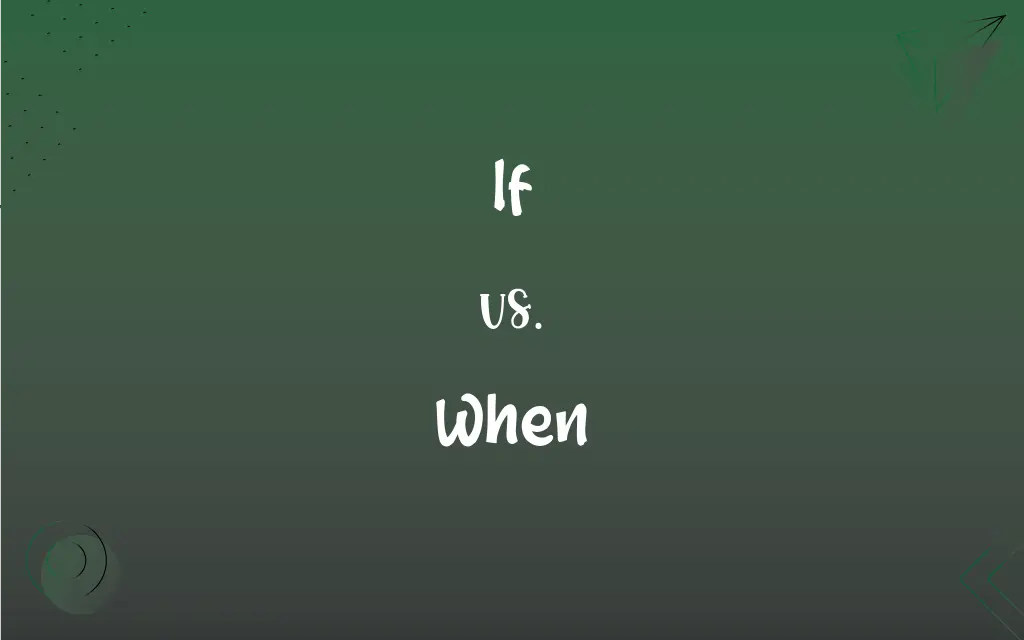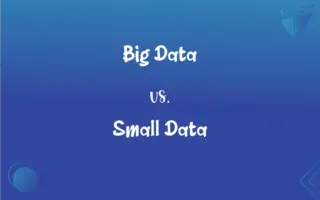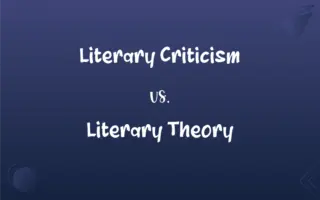If vs. When: What's the Difference?
Edited by Aimie Carlson || By Harlon Moss || Published on December 17, 2023
"If" suggests a condition or possibility, whereas "when" refers to the time at which something will happen or is expected to happen.

Key Differences
The word "if" is used to introduce a conditional clause, indicating a situation or event that is possible or hypothetical. In contrast, "when" is used to specify a time, indicating the occurrence of an event at a certain moment.
"If" implies uncertainty and is often used in scenarios where there are contingencies or prerequisites. On the other hand, "when" assumes that the event will definitely happen, focusing on the timing rather than the possibility.
In sentences, "if" creates a sense of speculation or conjecture about an event or condition. Conversely, "when" is used when the occurrence is certain, and the interest is in the timing or sequence of events.
"If" is commonly used in conditional statements, which may or may not come true. "When," however, is used in contexts where the event is anticipated or expected to occur without doubt.
The use of "if" often leads to the creation of different scenarios or outcomes, depending on the condition being fulfilled. In contrast, "when" is used for situations where the outcome is certain, and the focus is on the timing or circumstances of its occurrence.
ADVERTISEMENT
Comparison Chart
Indication
Condition or possibility
Specific timing or occurrence
Certainty
Uncertain or hypothetical
Certain or definite
Usage in Sentences
Creates speculative or conditional scenarios
Specifies the time of an event
Type of Statement
Conditional
Temporal
Implication of Occurrence
May or may not happen
Will definitely happen
ADVERTISEMENT
If and When Definitions
If
Suggests speculation or conjecture.
If he arrives on time, we can start the meeting.
When
Refers to the moment something happens.
When she heard the news, she was overjoyed.
If
Introduces a conditional clause.
If it rains, we will cancel the picnic.
When
Specifies a particular time.
When the clock strikes twelve, we will start the show.
If
Used to describe a potential scenario.
If I win the lottery, I will buy a car.
When
Indicates the timing of an event.
When I finish this project, I’ll help you with yours.
If
Indicates a possibility or hypothesis.
If you study hard, you might pass the exam.
When
Used to describe an event's occurrence.
When you arrive, please call me.
If
Expresses a prerequisite for something to happen.
If you complete your homework, you can play video games.
When
Marks a specific point in time.
When the summer comes, we’ll go to the beach.
If
In the event that
If I were to go, I would be late.
When
At what time
When will we leave?.
If
Granting that
If that is true, what should we do?.
When
At the time that
In the spring, when the snow melts.
If
On the condition that
She will play the piano only if she is paid.
If
Although possibly; even though
It is a handsome if useless trinket.
If
Whether
Ask if he plans to come to the meeting.
If
Used to introduce an exclamatory clause, indicating a wish
If they had only come earlier!.
If
A possibility, condition, or stipulation
There will be no ifs, ands, or buts in this matter.
If
Supposing that, assuming that, in the circumstances that; used to introduce a condition or choice.
If it rains, I shall get wet.
I'll do it next year —if at all.
If
(computing) In the event that a statement is true (a programming statement that acts in a similar manner).
If A, then B, else C.
If
Supposing that; used with past or past perfect subjunctive indicating that the condition is closed.
I would prefer it if you took your shoes off.
I would be unhappy if you had not talked with me yesterday.
If I were you, I wouldn't go there alone.
If
Supposing that; given that; supposing it is the case that.
If that's true, we had better get moving!
If
Although; used to introduce a concession.
He was a great friend, if a little stingy at the bar.
If
Whether; used to introduce a noun clause, an indirect question, that functions as the direct object of certain verbs.
I don't know if I want to go or not.
If
Even if; even in the circumstances that.
If
Introducing a relevance conditional.
I have leftover cake if you want some.
If
(informal) An uncertainty, possibility, condition, doubt etc.
If
In case that; granting, allowing, or supposing that; - introducing a condition or supposition.
Tisiphone, that oft hast heard my prayer,Assist, if Œdipus deserve thy care.
If thou be the Son of God, command that these stones be made bread.
If
Whether; - in dependent questions.
Uncertain if by augury or chance.
She doubts if two and two make four.
FAQs
What does 'if' imply in a sentence?
It implies a condition or possibility.
Is 'when' used for hypothetical situations?
No, 'when' is used for definite occurrences.
How does 'if' impact a sentence's meaning?
It creates a scenario that depends on a condition being met.
Can 'if' be used to express certainty?
No, 'if' typically expresses a conditional or uncertain scenario.
Is 'if' used in conditional statements?
Yes, 'if' is a key word in conditional statements.
Can 'if' indicate a cause-and-effect relationship?
Yes, it often sets up a cause-and-effect scenario.
What type of clause does 'when' introduce?
It introduces a temporal clause.
Does 'when' always refer to future events?
No, 'when' can refer to past, present, or future times.
How does 'if' differ from 'whether'?
'If' implies conditions, while 'whether' indicates alternatives.
What does 'when' indicate?
It indicates a specific time or moment.
Can 'when' be used to sequence events?
Yes, 'when' can sequence events in time.
Does 'if' suggest speculation?
Yes, 'if' is often used to speculate about what might happen.
Can 'if' be replaced with 'when' in a sentence?
Not usually, as they have different meanings.
How do 'if' and 'when' differ in certainty?
'If' is uncertain, while 'when' assumes certainty.
Can 'if' introduce a hypothetical future event?
Yes, it's often used for hypothetical future scenarios.
Is 'when' used in questions about time?
Yes, it's often used in questions about the timing of events.
Is 'when' only used in factual contexts?
Mostly, but it can be used in hypothetical contexts as well.
Can 'if' be used to express wishes?
Yes, in conditional wish statements.
Does 'when' have a conditional aspect?
No, 'when' does not imply a condition.
Does 'when' always imply a known time?
Not always known, but it does refer to a specific time.
About Author
Written by
Harlon MossHarlon is a seasoned quality moderator and accomplished content writer for Difference Wiki. An alumnus of the prestigious University of California, he earned his degree in Computer Science. Leveraging his academic background, Harlon brings a meticulous and informed perspective to his work, ensuring content accuracy and excellence.
Edited by
Aimie CarlsonAimie Carlson, holding a master's degree in English literature, is a fervent English language enthusiast. She lends her writing talents to Difference Wiki, a prominent website that specializes in comparisons, offering readers insightful analyses that both captivate and inform.






































































